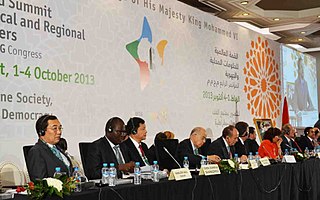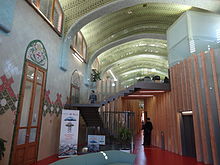
A slum is a highly populated urban residential area consisting of densely packed housing units of weak build quality and often associated with poverty. The infrastructure in slums is often deteriorated or incomplete, and they are primarily inhabited by impoverished people. Although slums are usually located in urban areas, in some countries they can be located in suburban areas where housing quality is low and living conditions are poor. While slums differ in size and other characteristics, most lack reliable sanitation services, supply of clean water, reliable electricity, law enforcement, and other basic services. Slum residences vary from shanty houses to professionally built dwellings which, because of poor-quality construction or lack of basic maintenance, have deteriorated.
The United Nations Commission on Sustainable Development (CSD) was a body under the UN Economic and Social Council (ECOSOC) tasked with overseeing the outcomes of the 1992 United Nations Conference on Environment and Development/Earth Summit. It was replaced in 2013 by the High-level Political Forum on Sustainable Development, which meets both under the General Assembly every four years and the ECOSOC in other years.
Habitat II, the Second United Nations Conference on Human Settlements, was held in Istanbul, Turkey, from 3–14 June 1996, twenty years after Habitat I held in Vancouver, Canada, in 1976. Popularly called the "City Summit", it brought together high-level representatives of national and local governments, as well as private sector, NGOs, research and training institutions and the media. Universal goals of ensuring adequate shelter for all and human settlements safer, healthier and more livable cities, inspired by the Charter of the United Nations, were discussed and endorsed.
The United Nations Office at Nairobi in Nairobi, the capital of Kenya, is one of four major United Nations office sites where numerous different UN agencies have a joint presence. Established in 1996, it is the UN's official headquarters in Africa.

United Cities and Local Governments (UCLG) is an umbrella international organisation for cities, local and regional governments, and municipal associations throughout the world that is concerned with representing and defending the interests of local governments on the world stage.

Korogocho is one of the largest slum neighbourhoods of Nairobi, Kenya. Home to 150,000 to 200,000 people pressed into 1.5 square kilometres, northeast of the city centre, Korogocho was founded as a shanty town on the then outskirts of the city.

World Habitat Day is marked on the first Monday of October each year, and is recognized by the United Nations to reflect on the state of towns and cities, and on the basic right of all to adequate shelter. The day is also intended to remind the world that everyone has the power and the responsibility to shape the future of towns and cities. World Habitat Day was first celebrated in 1986 in Nairobi, Kenya, and the theme chosen for that year was "Shelter is My Right".

The World Urban Forum (WUF) is the world’s premier conference on urban issues. It was established in 2001 by the United Nations to examine one of the most pressing issues facing the world today: rapid urbanisation and its impact on communities, cities, economies, climate change and policies.

The UN-Habitat Scroll of Honour Award was created by the United Nations Centre for Human Settlements (UNCHS) in 1989 to encourage and recognize the countries, governments, organizations, and individuals who have made great contributions to the development of housing. It is the most prestigious human settlements award in the world by the United Nations, given by the United Nations Human Settlements Programme (UN-Habitat), and has recognized 192 initiatives since its launch in 1989.
The term Habitat I refers to the first United Nations Conference on Human Settlements, in Vancouver, British Columbia in Canada, 31 May – 11 June 1976, which was convened by the United Nations as governments began to recognize the magnitude and consequences of rapid urbanization.

In the United Nations, the Post-2015 Development Agenda was a set of talks and discussion that led to the creation of the 2016 Sustainable Development Goals. This replaced the 2015 Millennium Development Goals.

Cities Alliance is a global partnership fighting urban poverty and supporting cities to deliver sustainable development. To manage its activities, the Cities Alliance operates a multi-donor fund with UN Office for Project Services (UNOPS), as host and trustee. Different members provide direction, financing and advocacy. Cities Alliance aims to deliver solutions to urban poverty.
Habitat III, the United Nations Conference on Housing and Sustainable Urban Development, took place in Quito, Ecuador, from 17 – 20 October 2016.

A Human Rights City is a municipality that engages with human rights. There are other definitions of human rights city available which are more specific and look at the human rights city from a particular angle. One says that a Human Rights City is a municipality that refers explicitly to the Universal Declaration of Human Rights and other international human rights standards and/or law in their policies, statements, and programs. Another definition states that a Human Rights City is 'a city which is organised around norms and principles of human rights'. This sociological definition emphasises the Human Rights City as a process to which to a varying degree a variety of agents contribute: from activists, experts and academics to international organisations, state governments, and local authorities and officials. Also, this definition does not qualify human rights as international, based on the fact that cities sometimes articulate human rights in their own charters in ways that have no formal or immediate recognition in international law, and may anticipate their appropriation by international bodies and incorporation into international law. The author claims that this definition captures better the different ways in which cities engage with human rights and participate in their co-production, not simply as receivers but also agents of human rights.

Established in 1992, the Major Group for Children and Youth is the United Nations General Assembly mandated, official, formal and self-organised space for children and youth to contribute to and engage in certain intergovernmental and allied policy processes at the United Nations.

Dato' Seri Paduka Maimunah binti Mohd Sharif is the Executive Director of the United Nations Human Settlements Programme (UN-Habitat). She assumed office in January 2018, becoming the first Asian woman to serve as Executive Director of UN-Habitat. On 20 January 2022, she was re-elected by the UN General Assembly for a two-year term that ends on 19 January 2024.
Victor Kisob is the former Deputy Executive Director of the United Nations Human Settlements Programme UN-HABITAT at the level of UN Assistant Secretary-General. He was appointed as Deputy Executive Director on 25 July 2018 by the United Nations Secretary-General António Guterres.

United Nations Advisory Committee of Local Authorities (UNACLA) is a committee of local authorities that serves as an advisory body to United Nations System for the purpose of strengthening the dialogue with local authorities from all over the world involved in the implementation of the Habitat Agenda.

Sustainable Development Goal 11, titled "sustainable cities and communities", is one of 17 Sustainable Development Goals established by the United Nations General Assembly in 2015. The official mission of SDG 11 is to "Make cities inclusive, safe, resilient and sustainable". The 17 SDGs take into account that action in one area will affect outcomes in other areas as well, and that development must balance social, economic and environmental sustainability.
World Cities Day is an annual United Nations observance day held on 31 October. The global observance, first held in 2014, is organized by the United Nations Human Settlements Programme (UN-Habitat) in coordination with each year's selected host city.















